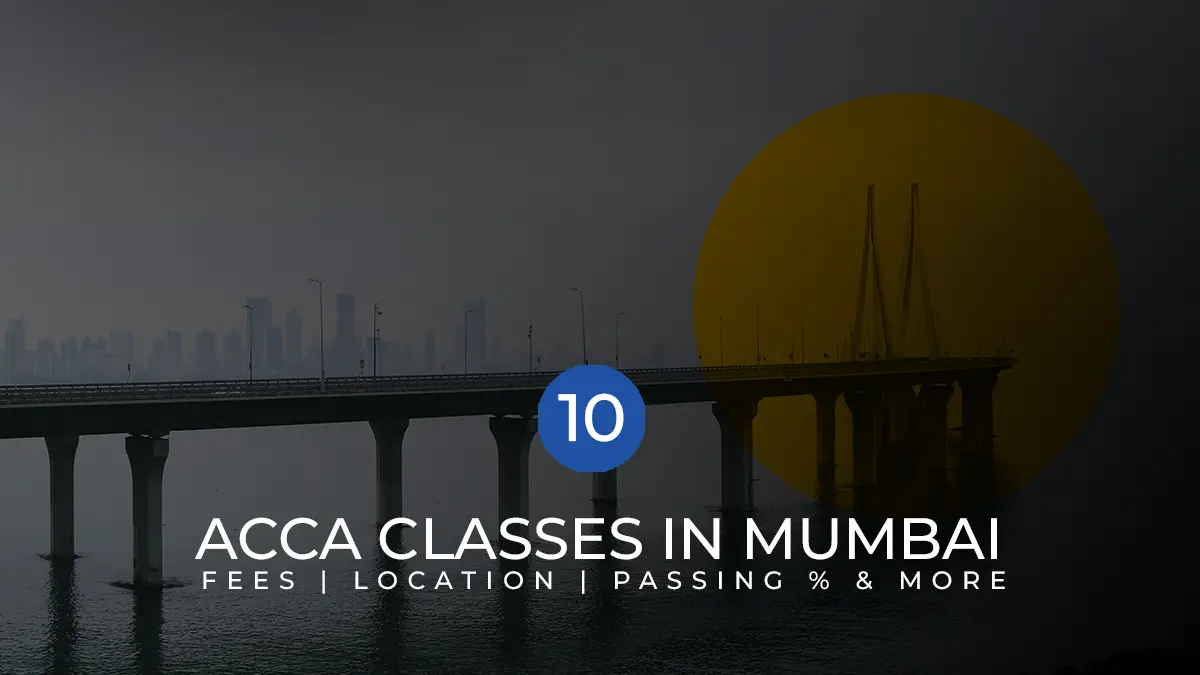
Accounting, Financial Reporting, Auditing, Taxation, Business Finance, Financial Management, and Chartered Accountancy are covered by the ACCA.
The ACCA requires candidates to take a total of 13 tests. Knowledge, Skill, and Professional are the three levels of the 13 tests.
Knowledge Level examinations are on-demand computer-based exams (CBEs) that can be taken at any time during the year. The Skill and Professional Level tests are held Every March, June, September, and December. The ACCA course fees in India can range from INR 20,000 to 2,50,000. The candidates can look up updates online for fluctuations in the cost of doing ACCA in India.
ACCA fee structure
ACCA Exam takes place 4 times a year: March Session, June Session, September Session and December Session. Since the ACCA fee structure requires payment to be made in GBP, the cost of doing ACCA in India is subjected to currency rate fluctuation. All applicable fees must be paid before the start of each semester.
ACCA Exam Fees may vary for each topic, except papers exempted in our graduating degree (F1 – F7), and are subject to change at any time.
Scope
ACCAs are employed in more than 180 countries worldwide. The United Kingdom, Canada, Australia, Singapore, and Dubai are the most popular nations for students studying in India. In the majority of these nations, ACCAs have signature authority.
Right recognition and certification
As an ACCA member, you will be recognised in 181 countries and have certification rights in 78 countries.
In India, the scope of ACCA is expanding at a rapid pace. ACCA members are finding professional careers in global corporations and banks worldwide. Some examples are EY, PwC, Deloitte, KPMG, Grant Thornton, BDO, Accenture, Credit Suisse, Barclay’s, Standard Chartered, and others.
Corporate Finance, Audit and Assurance, Risk Advisory, Internal Audit, Taxation, Investment Advisory, and other job profiles for ACCA members in India.
These job offers are incredibly similar to Indian CAs in terms of classification, profile, and income packages.
ACCA is also internationally recognised, and many ACCAs have found work in places such as the United Kingdom, Malaysia, Australia, Singapore, Canada, and Dubai.
Professional marks will be given for talents and skills that are in addition to – and distinct from – the intellectual level 3 competencies of assessments. Each of the Professional level papers has between four and six professional marks. These allow students to exhibit – and examiners to evaluate – the skills and capabilities companies expect ACCA members to have when they complete their qualifications. The question criteria will explicitly state where professional marks are assigned in each paper.
Prospects for the Future
The prospects for the future after doing ACCA far exceed the ACCA fees in India. ACCA is a highly sought skill in –
- Core Accounting
- Forensic Accounting
- Company Valuation
- Tax and Treasury Management
- Auditing
As an ACCA graduate, you will be prepared to take on a variety of tasks and to execute strategic duties at a high level.
Flexibility
The institute offers a current and practical curriculum that helps students better comprehend the subject in a shorter amount of time. Professionals are also entitled to a prompt option, which allows them to finish the course in a year. Meaning graduates appear for fewer exams than undergraduates, thereby reducing the cost of doing ACCA in India.
Exemptions for paper
Depending on one’s qualifications, one can receive up to 9 paper exemptions. For graduates, the cost of doing ACCA in India reduces since they do not have to appear for an exam that undergraduates are required to.
A holistic program prepares you for various professions; you can go on to work as a CFO or CEO and undertake strategic duties.
Because its members/students are scattered across 180 countries, multinational businesses are aware of the ACCA certificate. The Association of Chartered Certified Accountants is a global organisation that offers professional education. It is intended for people interested in pursuing a career in accounting, finance, or management. The ACCA registration fees come up to approx 1,20,000.
The qualification will let the student join the most significant international accounting body, resulting in a flurry of chances from top firms knocking on your door. The ACCA course also serves as a basis for other certifications, including BSc and MSc, and provides members with tools to assist them throughout their careers. For more updates on the ACCA fees in India, students should look up to the official website to know more.
Financial Accounting, Business Valuation, Mergers & Acquisitions, Risk Management, and other modules in the ACCA course help students become effective Auditors, Analysts, Bankers, Stock Market Executives, Chartered Accountants, and so on.
The eligibility criteria
- Students in the Commerce Stream (10+2)
- Students pursuing undergraduate degrees such as B.Com and BBA. Students with a B.A./B.Sc. with a foundation in accounting are also eligible.
- Students pursuing post-graduate degrees such as M.Com and MBA (Finance)
- Students pursuing IPCC or ICWA Chartered Accountant certification who desire to advance their careers with an internationally recognised membership.
- You may begin studying for your ACCA course while still in Class XI or XII and earn your degree simultaneously.
- Students earning bachelor’s degrees can also take the ACCA exam as part of their graduation requirements.
- Graduates (B.com / B.com H) / CA IPCC / CA Final students can also pursue this and are eligible for various exemptions.
- CA-qualified professionals can also pursue ACCA, with a maximum of nine papers exempted.
- A three-year full-time international standard curriculum that provides students with a good foundation for a successful future in accounting.
A student interested in pursuing an ACCA course in India must meet the following requirements:
- Qualified in 12th grade with a minimum of 50% aggregate in all courses and a minimum of 65% in Mathematics/Accountancy and English.
- Should have a minimum of three years of work experience in a suitable company – this can be done during or after the course.
The duration
- Students with no prior job experience can complete the course with examinations in three years, following which they must work for three years.
- Students with prior job experience can complete the program in two to three years.
- If a student chooses weekday classes, they can complete the course in two to three years with tests.
- If a student chooses weekend lessons, they can complete the course with tests in three to five years.
For all ACCA tests, a passing score of 50% is required. You are eligible to pass the paper if you receive a score of more than 50% on any of the papers. The ACCA fees in India may vary with respect to the currency rate of the pound. To know more about the fees, head over to the official ACCA website.
The overall quality of the replies and efficient, professional communication abilities are given professional ratings that include logic, sensitivity to the intended target audience, and structure and presentation. In all ACCA Qualification Professional level papers, professional marks are available. Getting these professional grades might be the difference between passing and failing.
The ACCA certificates
The ACCA Course certification qualifies the student for a BSc in Applied Accounting and a Master’s in Professional Accountancy, as well as making them job-ready in India and abroad. The credential provides students with cutting-edge abilities to help them succeed as notable finance experts.







Leave A Comment